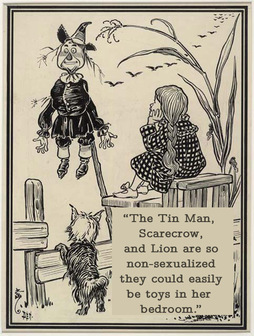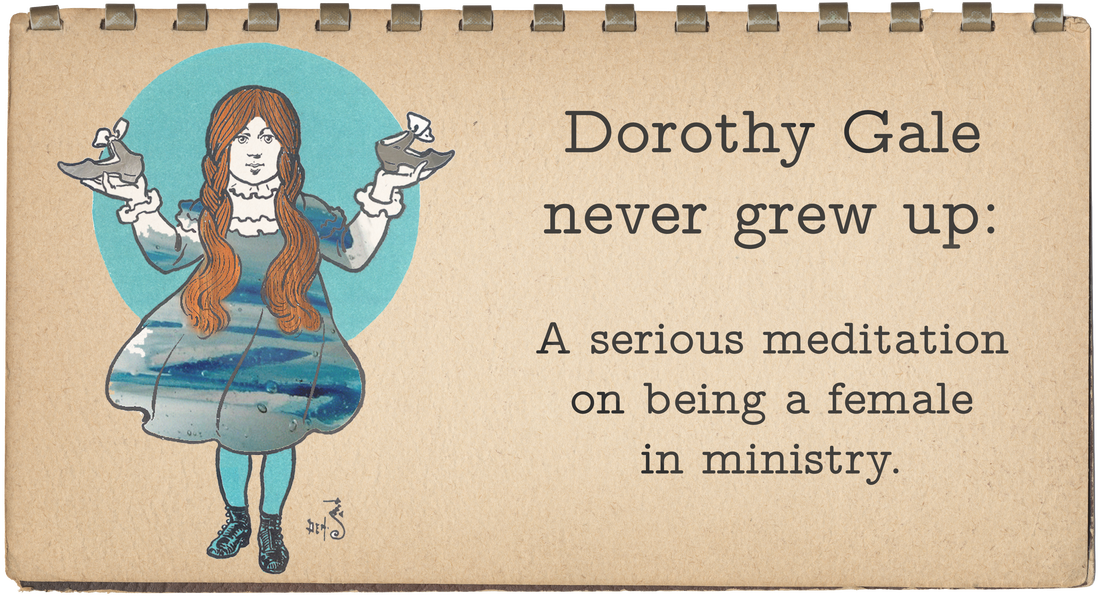|
Dorothy Gale never grew up. If you read Frank L. Baum’s books, eventually Dorothy, and her aunt and uncle, are whisked away to Oz to live. Since no one ages in Oz, Dorothy will forever be the little girl. This thought entered my mind as I considered the implications of Dorothy’s youth. She was allowed to be the hero without the overused subplot of romance. Other stories, featuring older female heroes are different. They remind me of a woman’s place. In Hunger Games, Katniss Everdeen’s salvation is ultimately tied to her choice of Peeta or Gale. In Frozen, Anna’s big lesson is not to rush into choosing a partner, but the happy ending still involves a hook-up. In Outlander, we are supposed to see Claire as a strong female lead, while her big choice is whether she should stay with her future husband or her past husband. (It’s OK Claire, your decision will be made simple by the other male coming out as a misogynistic cheater.)  I ultimately realized, as long as Dorothy remained a child, she could be whatever she wanted to be. We don’t have to see her story tied to matrimony. Anyway, it wasn't like she could fall in love with any of her companions. They all lacked human masculinity. The Tin Man, Scarecrow, and Lion are so non-sexualized, they could easily be toys in her bedroom. Even knowing this, I want her to grow up. I want to see what she looks like as an adult. Something happens to our girls. They reach a certain age, and everything is tied to their sex. In some ways it’s overt, and in other ways it’s very subtle. When purchasing summer clothes for a young girl, it’s very difficult to find shorts that are bigger than a washcloth. Female-focused stories can have a strong heroine, but only if her happy ending is tied to finding a guy. While a girl can be anything, a woman can be anything within her sexualized self. How would Dorothy handle this shift of purpose? Would she avoid marriage completely? Some women have, and lamented it. Guys can have marriage and a career. Women are often put in the situation where they must choose one or the other. Women, seeking equality, have spent generations trying to be like men. Maybe that’s not the answer. With men, their fictional stories can be told without the sexual subtext. Our Hero stories are not hidden means to find them a spouse. If the hero does find love, it is packaged like a prize at the end of the journey. They can be our heroes without anything attached to what that means. If a man gives his heart and soul to the job, there are not many voices saying, “Why isn’t he home with the wife and kids?” This is what exists under the surface of the subject of women in ministry. Our real life Dorothys must eventually grow up and deal with choices in relationship to others. Now to take a drastic shift from most female voices out there: This shouldn’t be a female thing; this should be a human thing. I once wrote, “We are not fighting a war on women, we are fighting a war on standards.” There is nothing wrong with the standard women are living out their call. Women ministers have to attempt to be without blame. They have to explain their calling within a scriptural context. If they are married, they must live out their ministerial call while also living out their family call. The issue is whether male ministers are living into the same standard. I question whether that is always the case. We are fighting a war on standards, because we want our male counterparts to be held to the same litmus test as us. These kind of assessments are embraced in regards to the general society. It’s when we move them to the church, the egg shells are spilled all over the floor, and everyone is forced to walk on them. The thing is, I’m not some manager seeking equality among my male counterparts. I’m a minister. It is my call. I know naming all those female leaders in the Bible isn’t going to help me. Deborah the Judge, Anna the Prophetess, or Lydia and Priscilla the missionaries cannot stand up against Paul. That’s just alright with me. I had said this was a war on standards, and I plan to use Paul’s words to explain how.
When I read any Biblical text, the first consideration I make is context. During this time period, women were property. Only a small percentage knew how to read basic items for work related reasons. An even smaller percentage knew how to write. This made education a commodity. It was not the daughters being taught how to read and write. While there were exceptions to the rule, there wouldn't have been women who could have read these early writings about Jesus Christ. All of this has to be taken into consideration when reading Paul’s words. Women were uneducated property. Half of this early truth, isn’t truth anymore. No one owns me, not even my husband. As for the other half, I have been to school to learn to read and write. I have also been to seminary to specifically learn about Christianity. I am an educated free female. I do not think this scripture was meant for my context. This doesn't mean we should throw it out. What does our communal context do with this scripture? The answer is education and priorities. Women are called to be wives and mothers in the home, just as men are called to be fathers and husbands. As women pick up the mantle of pastoral leadership, they are retaining their familial roles. In other words, our Dorothys are growing up, and they can be anything they want to be within their feminine selves. This is uncomfortable. We have male ministers who are not educated, and sacrifice their familial roles as ministers. We have spent generations glorifying these men. I believe, they have become the very thing Paul was rebuking in 1 Corinthians 14. Instead of the females being the uneducated voices, there are males who have taken their place. The roles have reversed, and now is the time when some men need to keep silent in church. We are fighting a war on standards because many females have become highly educated, family centered leaders. We have raised our own bar. We don’t want to drop down to this undereducated masculine standard, where some ignore the family for the sake of the job. We don’t want to be treated the same, in that respect. We want that standard raised. We want males to be treated like us. Dorothy must grow up, and in growing up she can take the female mantle with pride. I know I have. I am a female minister.
|
Categories
All
Archives
October 2023
|





 RSS Feed
RSS Feed